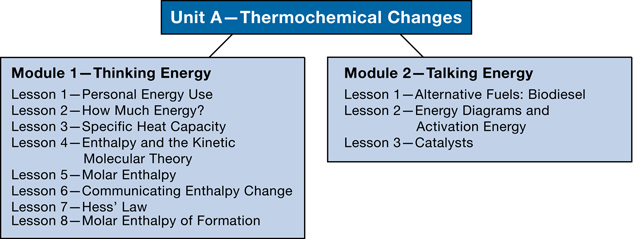Concept Organizer
1. Concept Organizer
Concept Organizer
Unit A—Thermochemical Changes
Module Descriptions
Module 1—Thinking Energy
Module 1 examines how energy changes in chemical reactions are determined and interpreted. You will use calorimetry to measure enthalpy changes, and you will use standard molar enthalpies of formation to predict the magnitude of energy changes associated with chemical reactions.
You will consider the following module questions:
- Should energy be given a higher priority when making decisions about society’s future?
- How does society use the energy of chemical changes?
- What are the impacts of energy use on the environment?
- How does society use knowledge of the energy associated with chemical processes to promote sustainability?
- In what ways have issues of energy use affected the development of past and present societies?
Module 2—Talking Energy
Module 2 investigates the events and energy changes associated with chemical reactions from the molecular level. You will learn about activation energy and the role that catalysts play in chemical processes. You will understand the function of catalysts from the perspective of chemical energetics.
You will consider the following module question:
- What energy changes must be considered when designing chemical systems?
Using the Concept Organizer
Each module and lesson contains focusing questions intended to guide your study. The following concept organizers list the module and lesson questions:
As you work your way through each module, think about how the lesson questions relate to the module questions and to questions from other lessons. Use the concept organizers to build a concept map or a graphic organizer for each module. To do this, you might use software you already have on your computer, or you might do an Internet search for free software you can use. In your concept map or graphic organizer, record and demonstrate how the lesson and module concepts are connected and interdependent.
Sample concept maps are provided in the Module Summary for each module. Remember that the samples are just that—they show only one of many possible descriptions. However, if your completed concept map or graphic organizer differs significantly from the sample, you may wish to contact your teacher or compare your map or organizer to those of your classmates. This will ensure that your interpretations of lesson materials and your descriptions are accurate.
